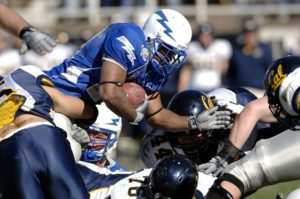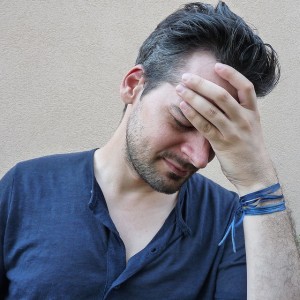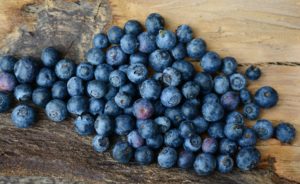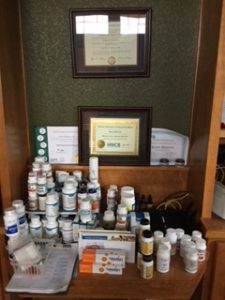Concussions:
The Diet and Supplements That You Need for a Head Injury
You most likely have experienced a concussion or know someone who has. Today with all the competitive sports, head injuries are becoming more and more common. Thankfully, with awareness, schools and sport coaches are understanding the importance of brain rest.
But head injuries are still more common than you may realize and continue to be on the rise among children, and teens.
Here Are Some Sobering Facts
- According to the CDC, the number of children going to the ER with a brain injury went up from 153,000 in 2001 to 250,000 in 2009! A 60% increase.
- In football and hockey, the number of actual concussions is six or seven times higher than the number diagnosed.
- At least 70% of football and 62% of soccer players get one concussion per year.
- A study from Archives of Pediatrics and Adolescent Medicine found that children who suffer from head injuries may experience lingering problems with attention and memory even 12 months after the injury.
These facts are not meant to scare you but for you to be aware how common head injuries are today, the impact they have on our mental health and what we need to do when they do occur.
Why More Than Just Rest Is Needed
Most people are not aware that there is much more you can do and should do beyond the first week or two. Many people just stop right there-rest for a few weeks and then go right back to their routine.
Both of my sons have sustained multiple concussions. Several from sports and one from a car running a red light and totaling the car they were in. I was like you, thinking, just give them some rest, keep an eye on them and when they seem fine in a few days to a couple weeks, then they can go back to their normal lifestyle.
Wrong thinking on my part!
While my youngest son seemed (to me at the time) to have no lingering effects from his head injuries, he will tell you to this day, that he noticed a change in himself from the one he sustained in middle school. He said his concentration and focus was never the same.
My oldest sustained, what looked like a very minor head injury in hockey. After two weeks he seemed fine and went back to playing.
But he wasn’t fine.
He ended up having lingering effects and for a while there even his personality seemed to be “off”, not like himself.
And just last night my son’s college hockey line mate took a hard hit but he continued to finish out the game and everyone thought he was fine,yet after the game in the locker room he started to vomit and was confused. He did not lose consciousness yet he still sustained a head injury.
So now I’m always ready. I have the supplements on hand, so I can start them right away.
The brain needs support! I cannot stress this enough. Even if they seem fine within a couple days. I suggest keeping them on the supplements and diet for at least 30 days, but 90 days is preferable and for a more serious head injury it could be for 6 months to a year with additional therapies involved.
If you are reading this and are thinking, “well, my head injury was 6 months or longer ago, no point in doing anything now”. No this isn’t true. You can still do this to heal and reduce brain inflammation.
After the car accident, we didn’t address my son’s head injury until 6 months later when we finally realized that some of his symptoms were related to the head injury. At first, we didn’t make the connection.
What is a Concussion
You may also hear it described at a mild traumatic brain injury. In this article this is what I am addressing. I am not talking about severe head injuries that require hospitalization and time in inpatient rehab (although these supplements would still benefit the person).
A mild traumatic brain injury is a silent epidemic as many do not take them seriously when they should be. Just because the person did not lose consciousness, does not mean they do not have a head injury.
I remember we took our son to Children’s Hospital for his head injury and the side effects and the attending doctor was not even sure he had a head injury (even though he was diagnosed the day after the injury when he could not even respond to simple questions and could not balance), because he did not (I kid you not) say “it felt like the lights went out”.
Because he did not describe it in this manner, they wouldn’t even get him the help he needed. It honestly was one of the most terrible medical experiences I have had (and I’ve had many).
Head Injury Facts
- You do not even need to hit your head (it can be from whiplash) Or for soldiers, from a bomb blast. For one of my son’s, a hockey stick hit him in the jaw-there was not hit to the head!
- They often go undiagnosed or misdiagnosed.
- Brain injuries are cumulative. Suffer more than one and the effects may accumulate and even a small impact can manifest as a more serious injury.
- A brain scan or MRI may appear normal (ask for a PET scan or a SPECT scan)
- Genetics can play a role in long term effects. If you have the Apo-E4 variant of the apolipoprotein E gene and have had a head injury your risk of dementia can increase tenfold.
- Rest is important for recovery
Short term Concussion Effects
Many of these symptoms tend to clear up within the first few months of recovery but some linger.
For instance, I know people who never regained sense of smell and taste or continue to have headaches and dizziness but not daily.
- Nausea
- Dizziness
- Vomiting
- Sleep issues
- Blurred vision
- Headaches
- Sensitivity to light
- Fatigue
- Brain fatigue
- Loss of balance
- Decrease in smell and taste
- Difficulty swallowing
Long Term Concussion Effects to Watch Out For
Theses can occur right away and not go away or may seem to come out of no where weeks or months after the head injury. Some may go away during the first few months of recovery but other symptoms may last much longer.
For most of you, these symptoms resolve within the first few months but for some of you these symptoms can be persistent.
Factors that can influence this includes how healthy you were at the time of the injury, your genes, and your age at the time of the injury.
- Depression (one of the most common side effects)
- Mood swings
- Fearfulness
- Apathy
- Low motivation
- Anxiety
- Frustration
- Feelings of helplessness
- Nightmares
- Anger
- Sudden outbursts
- Mania
- Memory loss
- Short attention span
- Slowed thinking
- Brain fatigue
- Forgetful
- Spelling difficulty
- Difficulty following conversations
- Cannot multitask
- Can’t finish tasks (or can’t even start them)
- Can’t focus on reading, computer work
- OCD
- Increased risk for developing addiction/binge drinking
What to Do
Sleep and rest are very important, and your doctor will tell you this. But often for these cases of “mild” head injuries that is all they tell you. Sleep is part of the healing process and you may find that in the first few days after the injury, all you seem to do is sleep. If the body needs it, don’t fight it!
Also avoid the computer, video games, action or violent movies as much as you can in the first few weeks. In the first few days, it is best to avoid all TV, iPhone and computer use if possible. There are several reasons for this. The flicker rate that is invisible to the naked eye is picked up by the brain and can exacerbate the post concussion headaches, there is also back lighting on the screens which also have invisible pulsing that can make symptoms worse and lastly the blue light can exacerbate your symptoms. Special glasses such as TheraSpecs may be useful if you cannot avoid screen time.
There is also data to support that acupuncture can be a useful tool to add in for head injuries. I suggest you find an acupuncturist that specializes in head trauma. My personal favorite locally for head trauma is Rebecca Baker in Castle Rock, CO at Acupuncture Associates of Castle Rock.
Diet for Head Injuries
- Eat balanced meals. While I don’t support eating junk food, this especially is not the time for it. Your brain needs fuel to reduce inflammation and to support healing. Eat meals and snacks that contain protein, healthy fats and small amounts of carbs. For instance, eggs, veggies and avocado; almond butter and an apple, chicken and garbanzo bean salad with home made dressing.
- Stick to whole foods. Keep out the frozen meals, the packaged snacks, candy, preservatives, juice, soda etc
- Fast overnight. Go at least 12 hours from dinner to breakfast (up to 16 hour fast, if you have balanced blood sugar and are not diabetic)
- Add in good fats. If you are not used to eating raw nuts and seeds, oily fish, coconut oil, avocado and extra virgin olive oil, now is the time to add in these fats to support brain health.
- Keep diet lower in carbs. You don’t have to go low carb/ketogenic such as only 20 grams per day, but keep carbs in the whole food form and try to keep carbs 80 to 150 grams per day for recovery. (avoid low carb and high fat diet if you had your gallbladder removed or have kidney disease).
Supplements for Concussions
Before adding in any supplements check with your health care professional especially if on medication or if you have other health issues. Some of these supplements may not be safe to take with some medications or health conditions.
Read my comments at the end of the supplement section as what products you use and where you get them will be very important!
Fish Oil
Your brain is mostly made up of fat. Your myelin sheath that covers the nerves is also mostly fat. Adding in essential fatty acids is critical to help rebuild the cell membrane so that you can heal and restore brain health.
The dose for head injuries is high and should be used only short term (Depending on the injury and symptoms anywhere from 90 days to one year at a high dose) Take fish oil with a meal that contains fat. Ideally with your larger meal of the day.
Check the quality of the fish oil that you are using. Our oceans are filled with chemicals and pollutants and it not as easy to avoid these in our fish and fish oil products. This is very important. Make sure that the fish oil has been sustainably harvested and that the fish oil company has a purification process in place. When in doubt, call the company.
Two products that I like for high dose are Biotics Research Biomega-1000 and Nordic Naturals Pro-omega 2000. These are higher dose products that are needed for head injuries for short term.
If you want to get some of your EPA and DHA via fish these are good fatty fish options
- Wild caught Alaskan Salmon
- Mackerel
- Sardines (I like Wild Planet Brand)
- Herring
- Black Cod
- Omega-3 enriched eggs
- Anchovies
- Cod liver oil
Vitamin C
Vitamin C is a very important antioxidant for brain health. In fact, the highest levels of ascorbate in the body are found in the brain. It also acts as a cofactor for several neurotransmitters.
Take 1,000 mg (1 g.) to 3,000 (3 g.) per day in divided doses. Vitamin C is a relatively cheap supplement but for a head injury you may want to splurge short term on liposomal vitamin C to increase bioavailability in the cells. Vitamin C has a short half-life. For this reason, take it 3 to 4 times per day, not all at once. In the case of a head injury, I prefer liposomal vitamin C and my “Go To” for Liposomal products is Quicksilver Scientific.
Liposomal products with smaller particle size are more bioavailable, with greater absorption.
Lithium Orotate
I would add this supplement in if depression has occurred after the head injury. Lithium orotate is different than the lithium that you may have heard of in the treatment of bipolar disease. That form of lithium (as citrate or coronate) is used at high doses and can cause toxicity to the kidneys and the thyroid. I also know people who have said they do not like how the lithium medication makes them feel and stop taking it.
Lithium is a naturally occurring alkaline trace mineral. Lithium Orotate can penetrate the blood brain barrier more than lithium carbonate compounds. Which means you need less of the compound to get results.
Dr. Jeffry Dach states that lithium can help the brain create new neurons and thus can aid in the recovery of a traumatic brain injury. He goes on to state there is a wide body of evidence to support lithium use for its neuroprotective benefits.
Lithium Orotate is used in low doses and in this form, the evidence suggests that it has a higher absorption rate into the central nervous system. It can support a balanced mood by repairing damaged neurons and by stimulating neuron growth. It can also alter and balance the neurotransmitters, dopamine, glutamate and GABA.
Use 5 mg. one to two times per day for depression, anxiety or impulsivity that did not occur until after the head injury incident. (some brands may have it in 4.8 mg of elemental lithium). Take with meals.
I use Complimentary Prescriptions brand
Phosphatidylserine (PS) and Phosphatidyl Choline (PC) and Myo-Inositol
Phospholipids are fats that make up the cell membrane. PS, PC and myo-inositol are part of the phospholipid family that are an important part of recovery. Inositol is also considered part of the B complex family.
Higher concentrations of PS correlate with higher amounts of the neurotransmitters acetylcholine, norepinephrine, serotonin and dopamine. PS also helps the body adapt to stress by decreasing cortisol output. When you suffer from a head injury your body may be in chronic stress mode and the PS can help with that.
PS is more effective if you are also taking DHA (from fish oil). Take 500 to 1000 mg of PS at night before bedtime. Most bottles of PS will be in 100 mg. amounts. You will need a higher dose for a head injury.
Choline plays an important role in cell membrane health and is used to improve memory and decrease anxiety. It can also reduce brain inflammation. PC dose is 800 to 2400 mg. per day.
Myo-Inositol can be safely taken at high doses of 12 to 18 grams per day for head injuries. At high doses it is can also be useful for depression, OCD, panic attacks, and other psychiatric disorders.
Curcumin
This is a compound found in turmeric. It has been shown to reduce inflammation. It is neuroprotective. Curcumin will also help to reduce the gut inflammation. (for more on the gut see below “What you may not know about your head injury”.)
My personal favorite is CuraPro By EuroMedica at the high dose of 750 mg. 3 times per day. For some, short term the dose may need to be doubled depending on the severity of the injury.
Magtein
This is a form of magnesium that can cross the blood brain barrier (BBB). Most us are deficient in magnesium due to our diet, and lack of the mineral in our depleted soils. Low levels in the body encourage inflammation in the body and make it harder for your brain to maintain neurotransmitter levels since magnesium is used as a cofactor.
The dose for a head injury should range from 1 to 2 grams per day in divided doses.
Vinpocetine
Vinpocetine comes from the lesser periwinkle plant Vinca minor that is used more often as a garden border. But Vinpocetine has been used since the 1960’s for brain health. It can influence your brain blood flow, blood vessels and brain cells so that it can be used to enhance the delivery of oxygen and nutrients to the brain. The dose is between 10 and 60 mg. per day.
Lions Mane
Lions Mane is a medicinal mushroom that can accelerate the growth of the myelin sheath. After a head injury, damage occurs to the sheath of the nerve leading to brain cells. Regenerating the myelin sheath therefore is very important during a concussion.
Take 2000 to 3000 in two doses. For medicinal mushroom products I like Host Defense
Wild Blueberry Extract
The more blueberries you eat, the more your head may be protected when injured! After a head injury, glutamate increases, destroying cells. In animal studies, when blueberry extracts were added to the cells glutamate, they were protected from damage.
While you can eat blueberries, during the time of injury it may be best to add in a supplement.
Vitamin D
Hopefully you know your D levels. Most people need to supplement with anywhere from 1000 to 5000 IU of D3 daily. Vitamin D deficiency may increase the inflammation damage and may increase your risk of behavioral changes after the injury. A simple blood test can tell you your vitamin D levels so that you can use the right dose for your head injury.
You can order the Vitamin D hydroxy test through me at www.directlabs.com/TruFoodsNutrition. This month it costs $45.
What You May Not Know About Your Head Injury
While brain issues may be noticeable or not surprising to you after the injury, what you may not realize is that a head injury can cause gut dysfunction and intestinal permeability.
This can lead to autoimmune disease and food sensitivities. People don’t often put the two together but there is a connection. For instance, you may have no issue with gluten but after a car accident you suddenly now have gluten sensitivity or celiac disease.
This is NOT a coincidence!
This is not as uncommon as you think. Thus, not only is supporting brain health important, but gut health as well. My add on protocol for a head injury is for the person to go through a gut healing regimen for three months. I use the gut healing products from microbiome labs.
What You Need to Know About Supplements
I have a pet peeve about supplements. I see you wasting your money buying store brands or getting products in the wrong forms or wrong amounts or buying them on Amazon.
What I have found is that many people try to find a cheaper brand or go through Amazon. If you do this, I cannot help you if you say a product did not work or you did not get results.
This is because high end supplements from Health Providers can only be sold through us. We sign agreements that we do not buy and then resell mass market on Amazon or anywhere else.
I have found quite a few fake supplement products on Amazon and do not trust the supplements via that sight. Also, these unethical people typically buy and store these supplements in hot warehouse temperatures thus destroying some supplement properties. Even Amazon has acknowledged that there have been fake supplements sold on their site.
If I do suggest a product that is mass market I will let you know that you can find it also in your local health store. My pricing is very comparable and often more affordable.
Do not go out and buy a similar product or worse yet, a product from a big box store. These have been examined and many have been found to not have what they claim to have.
If you want to order through my apothecary, send me an email and I will get you access.
Bottom Line
A head injury needs to be taken seriously. I see too many young athletes head right back into the contact sport. Rest is important, but adding in quality foods, low inflammatory diet, quality supplements can prevent or reduce long term side effects. It is best to work with a qualified health professional who is familiar with dealing with head injuries.
I know I have listed a lot of supplements and at high doses, but remember this is short term and you would rather support the brain now rather than wait until you see if you have long lasting side effects. I have heard too many stories of people suffering with lingering head trauma effects. Please don’t be another statistic.
Have you had a head injury? Do you think you have any lingering long term effects? Please reach out to me if you need more help with your symptoms from a head injury.
Sources
Bongiorno, P. (2015) Put Anxiety Behind You. The Complete Drug-Free Program. CA: Conari Press
Engle, D. (2017) The Concussion Repair Manual. A Practical Guide to Recovering from Traumatic Brain
Injuries. Full Spectrum Medicine.
Gaby, A. (2006) The Natural Pharmacy. Revised and Updated 3rd Edition. NY: Three Rivers Press
Keatley, MA & Whittemore, L. (2010) Understanding Mild Traumatic Brain Injury. CO: Brain Injury Hope
Foundation.
Kharrazian, D. (2013) Why Isn’t My Brain Working? CA: Elephant Press
http://journals.plos.org/plosone/article?id=10.1371/journal.pone.0160923
http://www.mdpi.com/2076-3921/5/4/36/pdf
http://www.lifeextension.com/magazine/2006/2/aas/Page-01
https://www.ncbi.nlm.nih.gov/pubmed/21615001
https://thehealthbeat.com/how-nutrition-can-help-concussions/












Lithium orotate has already been shown to NOT enter the brain more effectively than lithium carbonate, and the orotate ion is harder on the kidneys than is the carbonate ion. Nevertheless, I would support using up to 120 mg of lithium orotate daily if one is at risk for concussion, stroke, dementia, or any form of brain damage. 120 mg lithium orotate is equivalent to 150 mg lithium carbonate, the latter prescribable in the 150 mg “pediatric” capsule.
People on low dose lithium will not experience any of the side effects that occur when lithium carbonate is taken in the “therapeutic” amount used to treat bipolar disorder. Unfortunately, many people are “spooked” about lithium much more than they are about magnesium. I think that a small amount of lithium should be included in vitamin capsules.
Lithium orotate has already been shown to NOT enter the brain more effectively than lithium carbonate, and the orotate ion is harder on the kidneys than is the carbonate ion. Nevertheless, I would support using up to 120 mg of lithium orotate daily if one is at risk for concussion, stroke, dementia, or any form of brain damage. 120 mg lithium orotate is equivalent to 150 mg lithium carbonate, the latter prescribable in the 150 mg “pediatric” capsule.
People on low dose lithium will not experience any of the side effects that occur when lithium carbonate is taken in the “therapeutic” amount used to treat bipolar disorder. Unfortunately, many people are “spooked” about lithium much more than they are about magnesium. I think that a small amount of lithium should be included in vitamin capsules.
Hi Gary, thank you for your comments on lithium. What I have read is that lithium orotate when used at low doses is safe, not harmful for kidneys and does cross the BBB more effectively. Regardless, for a TBI I would try lithium orotate since you can purchase it OTC and do not need a script for it and would use it for its neurogenesis properties. Also, more than likely those with TBI would be using lithium orotate short term not long term. I dont recall doses off hand of those with bi-polar who said they did not like the way the lithium medication made them feel but I am sure it was not a very low dose.
Hi Gary, thank you for your comments on lithium. What I have read is that lithium orotate when used at low doses is safe, not harmful for kidneys and does cross the BBB more effectively. Regardless, for a TBI I would try lithium orotate since you can purchase it OTC and do not need a script for it and would use it for its neurogenesis properties. Also, more than likely those with TBI would be using lithium orotate short term not long term. I dont recall doses off hand of those with bi-polar who said they did not like the way the lithium medication made them feel but I am sure it was not a very low dose.